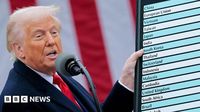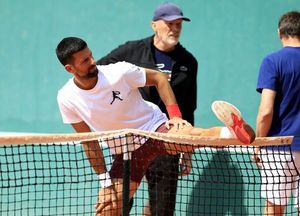In a significant turn of events, President Donald Trump's recently announced trade tariffs have sparked widespread international backlash, particularly from Europe. While the tariffs affect nearly every country globally, one notable exception is Russia, which has been interpreted by Moscow as a potential thawing of relations with the United States. This development has raised eyebrows and concerns among international leaders, prompting coordinated responses from the United Kingdom and France.
Trump's tariffs, which are aimed at protecting American industries, have not only drawn criticism from allies but have also led to fears of economic repercussions. The French government has specifically warned that these tariffs could lead to a loss of more than half a percent of the country's GDP, a statistic that underscores the potential economic fallout from such aggressive trade policies.
According to a report by ABC News, National Economic Council (NEC) director Kevin Hassett explained that the decision to exempt Russia from the tariffs was deliberate. He stated, "It was not appropriate to target Russia with new tariffs during negotiations over the war in Ukraine." This statement reflects a strategic approach by the Trump administration, aiming to keep diplomatic channels open while navigating the complexities of international trade and conflict.
Hassett further noted that although Russia is currently not facing tariffs, this does not mean that the country will enjoy a permanent reprieve. He hinted that the White House has not dismissed the possibility of imposing tariffs on Moscow in the future, saying, "I think the president made the decision not to conflate the two issues. It doesn't mean that Russia, in the fullness of time, is going to be treated wildly different than every other country." This comment suggests a nuanced approach to foreign relations, balancing economic sanctions with diplomatic efforts.
The exclusion of Russia from the tariffs has been perceived as an "important signal" by Russian officials, who view it as a step towards improving ties with the U.S. This perception could have significant implications for U.S.-Russia relations, particularly in light of ongoing tensions surrounding Ukraine.
Meanwhile, in Europe, the response to Trump's tariffs has been swift and unified. British and French leaders are planning to coordinate their strategies in response to the tariffs, indicating a strong front against what they view as an aggressive trade policy. The anger from European leaders stems from the potential economic damage these tariffs could inflict on their economies, which are still recovering from the impacts of the COVID-19 pandemic.
France's warning about the GDP loss highlights the seriousness of the situation. Economists are concerned that the tariffs could exacerbate existing economic challenges in Europe, leading to a slowdown in growth and increased tensions between the U.S. and its allies.
In light of these developments, the international community is closely monitoring the situation. The coordination between the U.K. and France signifies a potential shift towards a more unified European response to U.S. trade policies. The outcome of these discussions could shape not only the economic landscape but also the geopolitical dynamics between the U.S. and Europe.
As the situation unfolds, it remains to be seen how the Trump administration will navigate these complex issues. Will the U.S. maintain its current stance, or will it reconsider its approach in light of the growing international discontent? The coming weeks will likely prove crucial in determining the trajectory of U.S. trade relations and their broader implications for global diplomacy.
For now, the world watches as the U.S. grapples with the consequences of its tariffs, weighing the delicate balance between protecting domestic interests and maintaining vital international relationships.




